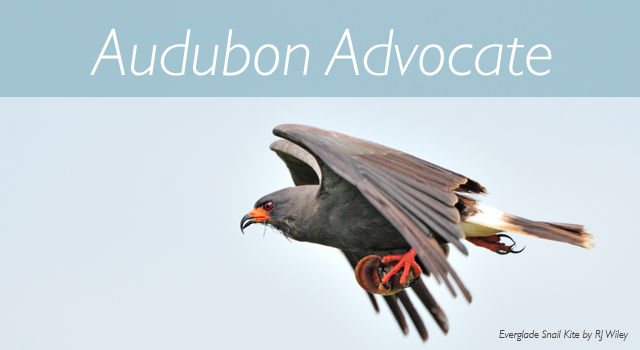
House Action on Senate Bill 10 Likely to Take Shape Next Week
As the regular legislative session heads into its final two-week stretch, much focus will continue on advancing water storage south of Lake Okeechobee in the Everglades Agricultural Area (EAA). Senate Bill 10 (SB 10) passed in the Senate with an overwhelming majority and focused on reaching water storage and quality goals by first using state-owned land. This gets us closer than ever to holding significant amounts of water south of the Lake.
The House has not yet taken action. But we could see a bill that includes the House response to SB 10 at any time. When voting to advance this important legislation, many Senators reported hearing from thousands of constituents. Your voice made a difference in the Senate! Weigh in now with your House Representative and ask them to support SB 10.
Lake Okeechobee Front and Center in Water Storage Discussions
Gov. Rick Scott said this week that he is in favor of the EAA Reservoir that is currently part of Senate Bill 10. He paired his support with a request for funding to repair the Herbert Hoover Dike that surrounds Lake Okeechobee. Gov. Scott requested $200 million for this project and relayed a commitment from President Trump for federal support of the repairs.
While fixing the Dike is important to avoid life-threatening failure, current repairs are not being done to directly accommodate higher water levels in Lake Okeechobee. As U.S. Senator Bill Nelson and Florida Senator Rob Bradley recognized last week, decisions about Lake Okeechobee’s water levels cannot happen without careful consideration of impacts to local communities, coastal estuaries, and the health of the Lake.
Lake Okeechobee Water Levels Through the Years: Are We Doomed to Repeat Past Disasters?
When talk ramps up about responding to water storage needs by treating Lake Okeechobee as a water storage reservoir, it is important to look back at the past consequences of holding more water in the Lake.
Audubon’s Dr. Paul Gray, who helps manage Audubon’s sanctuaries on the Lake, has compiled a brief history of Lake water management and the impact of different management schedules. The results of past practices show that holding more water in Lake Okeechobee can have devastating impacts and is not the answer to solving problems facing coastal estuaries. The report notes:
- When the management goal is to keep the Lake below 16 feet, and ideally between 12.5-15.5 feel, the Lake’s marsh, birds and fisheries tend to be robust.
- Significant harm to the Lake’s ecology coincides with periods when Lake management allowed levels to be held higher than 16 feet (1978-1992 schedule, 1992-2000 schedule, and 2000-2008 schedule).
- In 1988, an “ecological emergency” was declared on the Lake as a result of prolonged water levels between 15.5 and 18.5 feet.
- In 2000, another emergency was declared by the South Florida Water Management District after water levels were managed between 15.65 feet to 16.75 feet, resulting in the need to lower the Lake quickly.
- Check out Dr. Paul Gray’s full report: A Brief History of Lake Okeechobee Ecosystem Responses to Water Level Management.
More Counties Send Pro-Land Conservation Resolutions to Tallahassee
With the help of Audubon chapters, more and more local governments are expressing support for funding for land conservation through Florida Forever and the Rural and Family Lands Program. This week, St. Lucie and Madison Counties passed resolutions. Audubon will continue advocating that funding for land conservation be prioritized.
Audubon still needs your help! Could you take the time today to send your legislator a message and ask them to support Florida's land conservation programs - Florida Forever and the Rural and Family Lands Program? Taking some time to do this today could make a difference in regard to whether we have a Florida Forever program tomorrow.
Resolutions can be found here:
- All resolutions passed so far
- Osceola County (passed Feb. 20, 2017)
- Orange County (passed Feb. 21, 2017)
- Alachua County (passed March 14, 2017)
- Volusia County (passed April 6, 2017)
- St. Johns County (letters to legislative leaders sent April 10, 2017)
- Walton County (passed April 11, 2017)
- Madison County (passed April 12, 2017)
- St. Lucie County (passed April 18, 2017)
Septic Tanks and Water Quality
House Bill 285 by Rep. Fine passed the House this week. The bill requires the Department of Health to create a database with the location of all septic tanks in Florida and requires a disclosure upon the sale of real property upon which a septic tank is located. The Senate companion, Senate Bill 1748 by Sen. Stewart, passed its first committee this week and has two committee stops remaining before a full vote of the Florida Senate.
Audubon’s position is that the state needs to know where septic tanks are concentrated within watersheds in order to target septic to sewer conversions. To stop pollution, sources must be identified and then removed.
Updates From This Week's FWC Meeting
This week, the Florida Fish and Wildlife Conservation Commission (FWC) met in Tallahassee, hearing two important wildlife issues. After a staff report on the agency’s bear conservation efforts and heated public testimony, commissioners voted not to set a bear hunt quota this year or next. A quota is necessary for opening a bear hunt. Commissioners also voted to amend the state’s Bald Eagle rule and update FWC’s Bald Eagle species action plan. We hope the update to the plan will present an opportunity to address the growing impacts of rodenticides on Florida’s eagles.
Audubon’s 2017 Legislative Priorities
1. $150 million for Land Conservation including Florida Forever and Rural and Family Lands.
2. Support Senate President Negron’s proposal to buy land for reservoirs to send Lake Okeechobee south.
3. Advance water conservation and new limits on water pollution sources.
We hope we can count on you to stay engaged. Audubon is Florida’s most influential conservation voice. We show up at the right time, do our homework, and are respected for advancing science-based solutions. We propose more than we oppose. When we oppose, we work hard to stop bad ideas from becoming law.
Stay in Touch!
Show your love of birds today. Subscribe to receive email updates about Audubon's conservation work and hear about opportunities to help birds in your area or nationwide.




